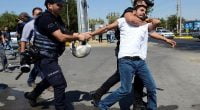Keyword: Torture

Turkish IT Technician Found Dead While Fleeing To Greece
The body of a Turkish IT specialist, who was fleeing Turkish crackdown, was recovered from a river that divides Turkish-Greek territory. Mr. Zumre is not the only one who tried to cross the Meric river into Greece. Hundreds of professors, journalists, and sacked public employees crossed the river to reach Greece. Many of them are living in Greek refugee camps.

Report: Police chief sets up teams to torture post-coup detainees
“The day I was detained, five police officers took me to a mountain and beat the hell out of me. I have been kicked in the head and genital area tens of times. I managed to identify two of the torturers. One of them was called Nejdet and the other one was Battal. Yet, maybe they use nicknames…. I do not have strength to tell you about all the humiliating sexual torture I faced that night,” a victim said.

Teacher who lost sanity under detention remains jail despite doctors’ reports
Tuğba Y., a teacher who lost her sanity due to alleged torture during weeks of interrogation, was arrested and has been kept in prison since late January despite doctors’ reports showing her deteriorating mental condition.

Wife says dismissed police chief left to die of colorectal cancer in İzmir prison
Yavuz Bölek, a former police chief who was dismissed from his job following corruption probes implicating Turkish President Recep Tayyip Erdoğan, has colorectal cancer and will soon be paralyzed if he is not given medical attention. His requests for treatment have been ignored.

Post-coup purge victim says he may never be a father due to torture in prison
One of the 48 victims said his testicles had been crushed and that a hard object was inserted into his anus while in prison. “I was kept naked in the cold. I was beaten. Pressure was applied to my genital area. The pain didn’t stop for months. I am a bachelor, and I may never be a father,” he said.

Erdoğan’s Religious Guide Approved Torture And Abuse In Turkey
Turkish president’s chief religious counsel Hayrettin Karaman, professor of Islamic law, has given approval to overlook torture and other crimes committed by members of security services, saying that Turkey is at total mobilization and under attack from within and outside.

My husband is being tortured and I am worried about his life
My husband was in an exhausted state when he got into the room. There were punch marks on his face. He was suffering psychologically; he begged not to go back down to the detention room. He was saying “If you wish to give me 50 years in prison, do so, but do not take me down there”.

Torture appeared widespread after Turkey coup: UN expert
Measures taken in Turkey after the July 15 coup attempt created an “environment conducive to torture”, and ill treatment appears to have been widespread immediately after the failed putsch, UN special rapporteur on torture Nils Melzer said told reporters in Ankara. “Some recently passed legislation and statutory decrees created an environment conducive to torture,” he said.

UN representative found evidence of torture in Turkish prisons
The majority of the abuse occurred during the times of arrest and interrogation, his report noted, adding that most of those who have been subjected to torture have not filed complaints “for fear of retaliation against them and their families and because of their distrust in the independence of the prosecution and the judiciary.

Turkey torture claims in wake of failed coup
Kamil continues. “‘If you don’t speak, we’ll bring your wife here and rape her in front of your eyes’, they said. Then they took me to a dark room and tried to forcefully insert a baton into my anus. When they couldn’t do it, they left. Maybe I will forget the other torture – but for the sexual part, it is carved into the dirtiest corner of my heart.”

Detainees ‘beaten, sexually abused and threatened with rape’ after Turkey coup, Human Rights Watch claims
In a 43-page report published on Tuesday, the human rights group said a “climate of fear” had prevailed since July’s failed coup against President Tayyip Recep Erdogan and the arrest of thousands under a state of emergency.

Human Rights Watch: Emergency Decrees Facilitate Torture in Turkey
Turkish police have tortured and otherwise ill-treated individuals in their custody after emergency decrees removed crucial safeguards in the wake of a failed coup attempt in July, 2016, Human Rights Watch said in a report released today. The report details 13 cases of alleged abuse, including stress positions, sleep deprivation, severe beatings, sexual abuse, and rape threats, since the coup attempt.

Imprisoned Gülen followers subject to rape, nail extraction, object insertion: lawyers association
People imprisoned as part of a government crackdown on the Gülen movement are being systematically tortured in the most barbaric ways including rape, removal of nails and the insertion of objects into their anuses, according to the president of a leading lawyers association.

Human rights associations up in arms over deputy’s remarks on torture allegations
In an open letter to the Turkish Parliament, six Turkey-based human rights associations on Thursday criticized recent remarks of ruling Justice and Development Party (AKP) deputy Mehmet Metiner, who said the government would ignore allegations of torture and mistreatment if victims were sympathizers of the Gülen movement.


















